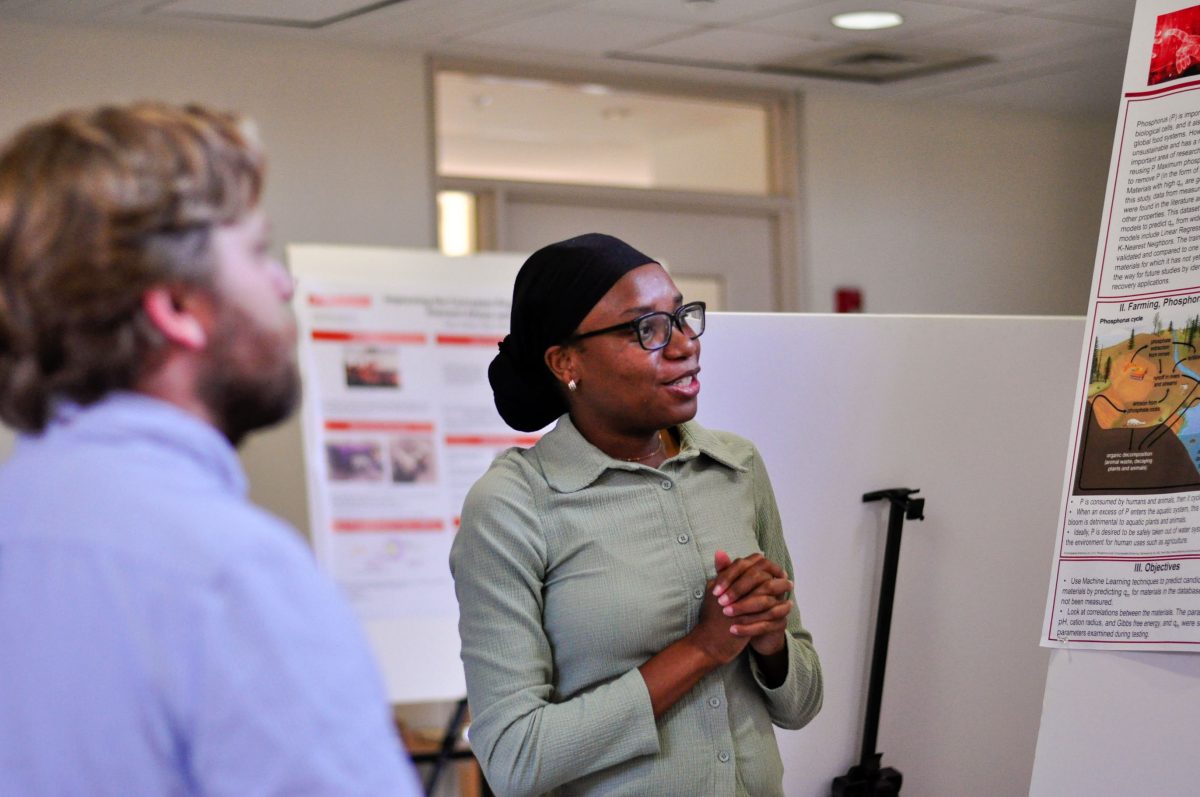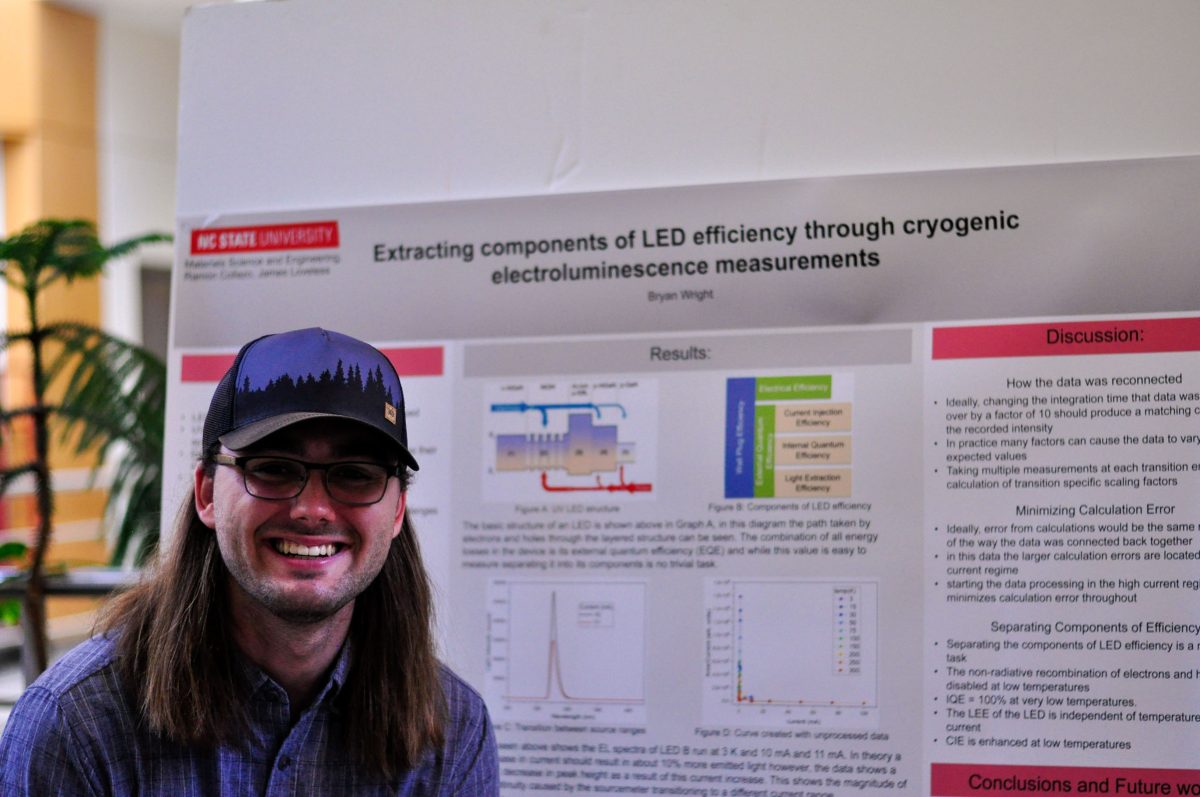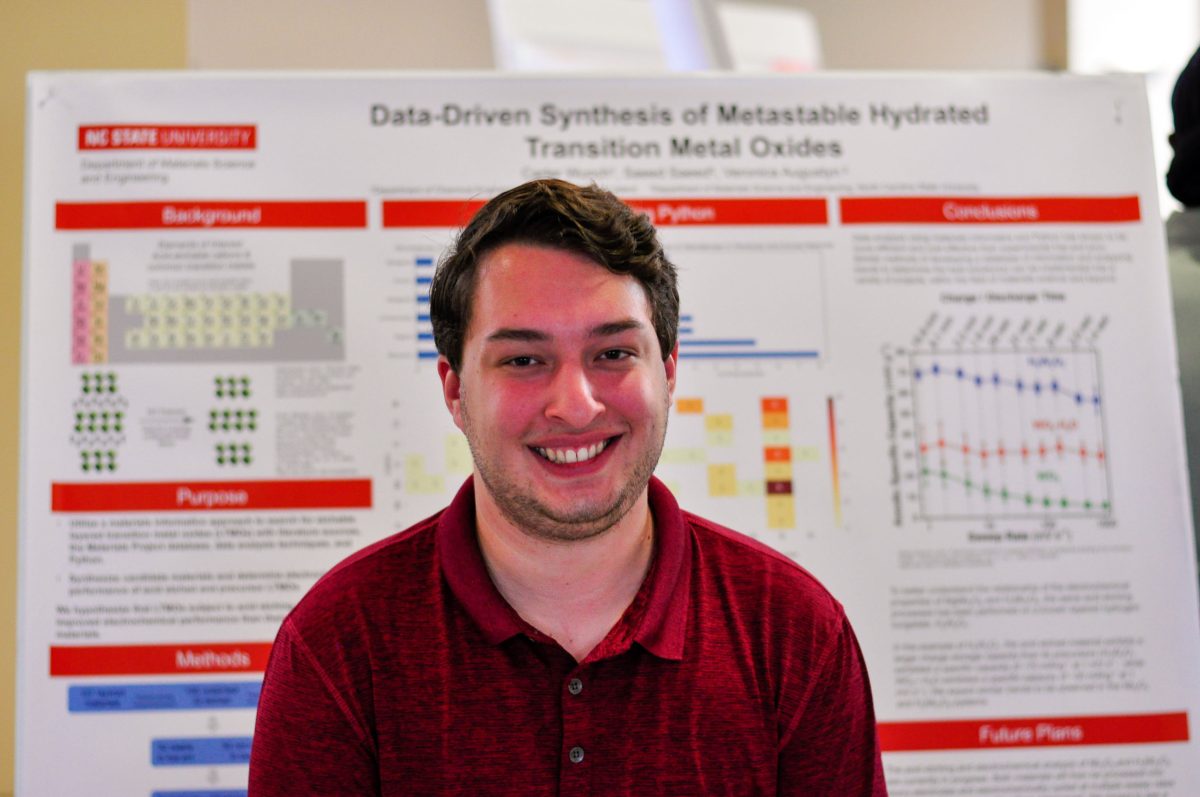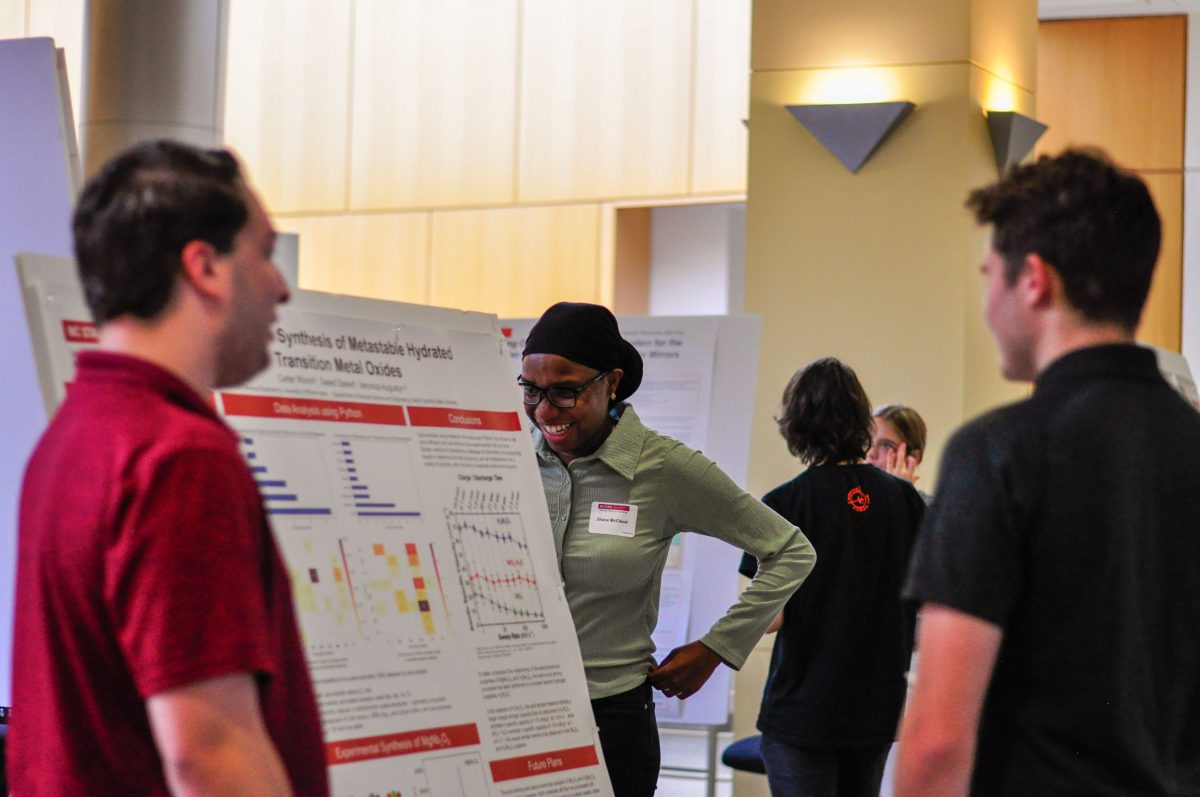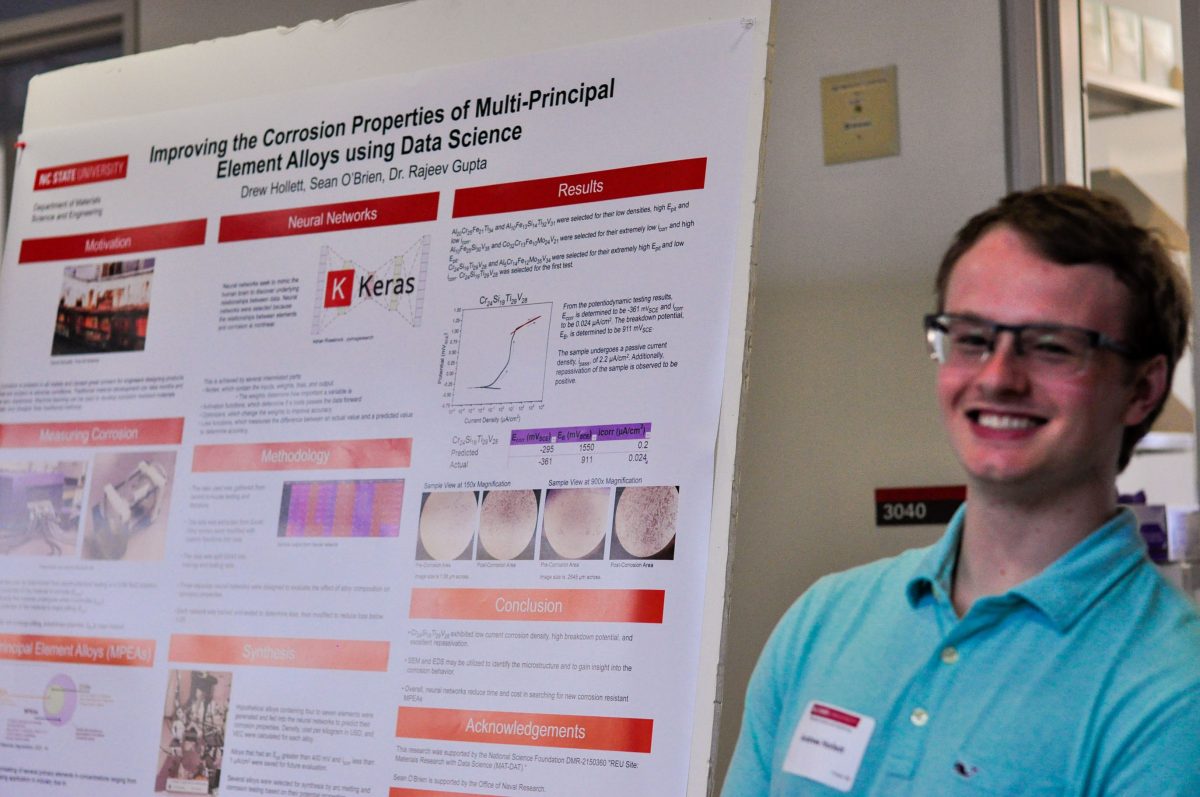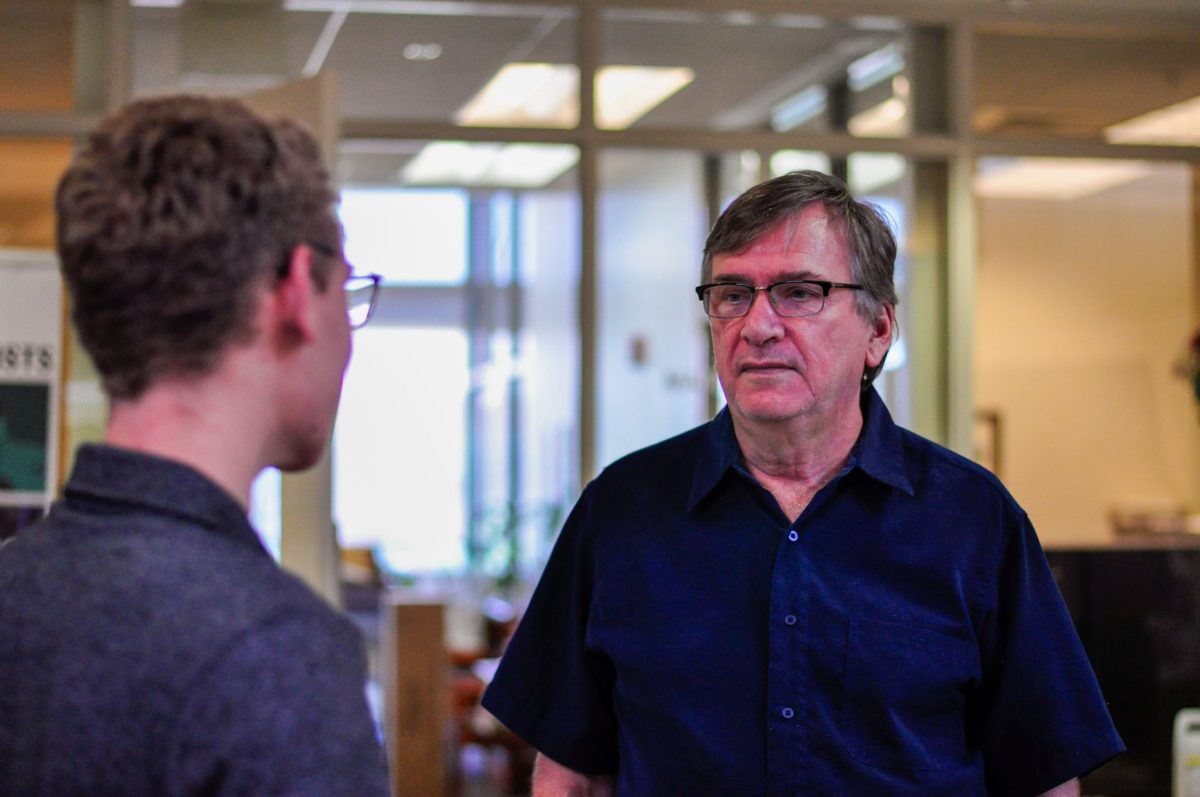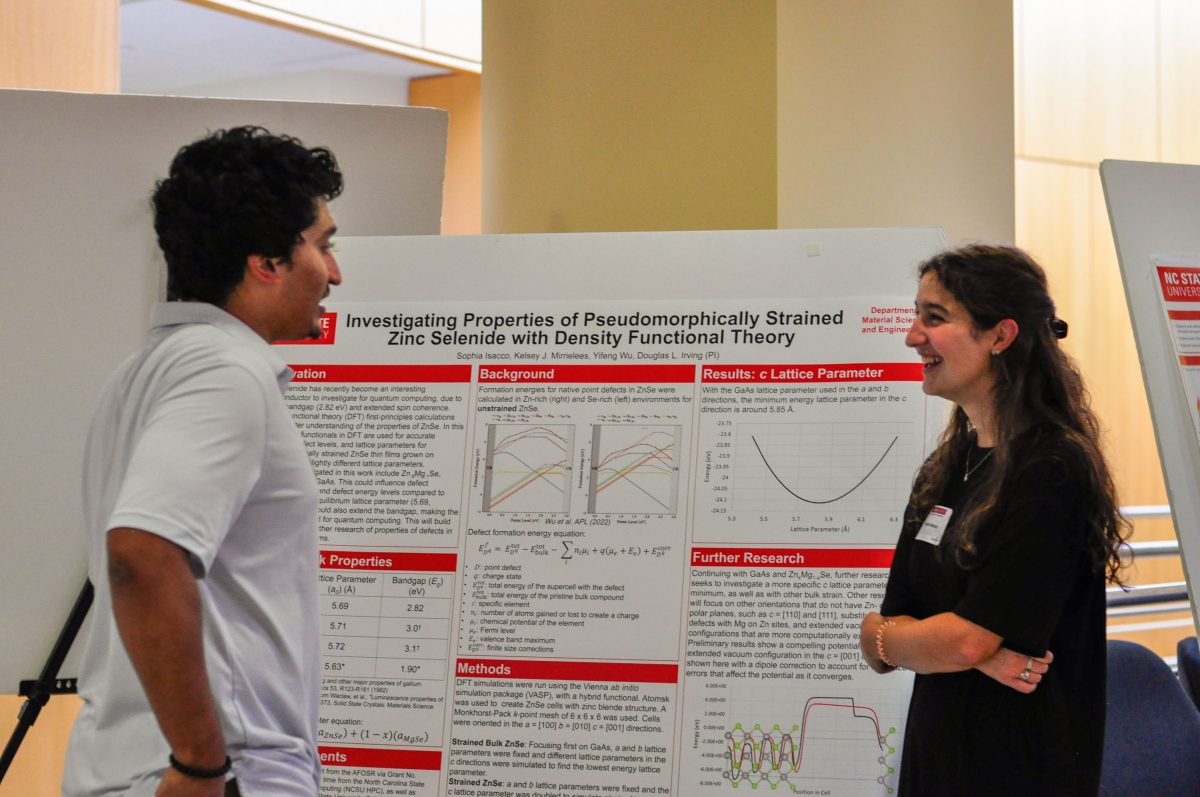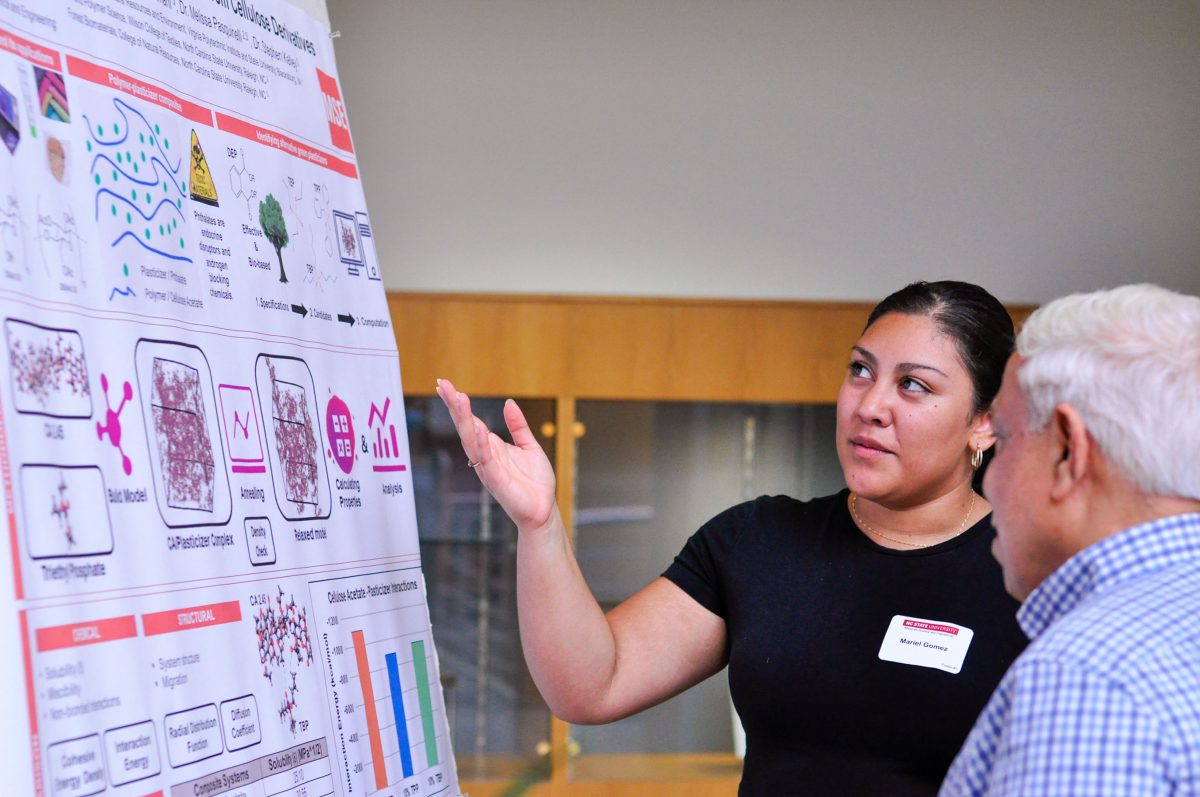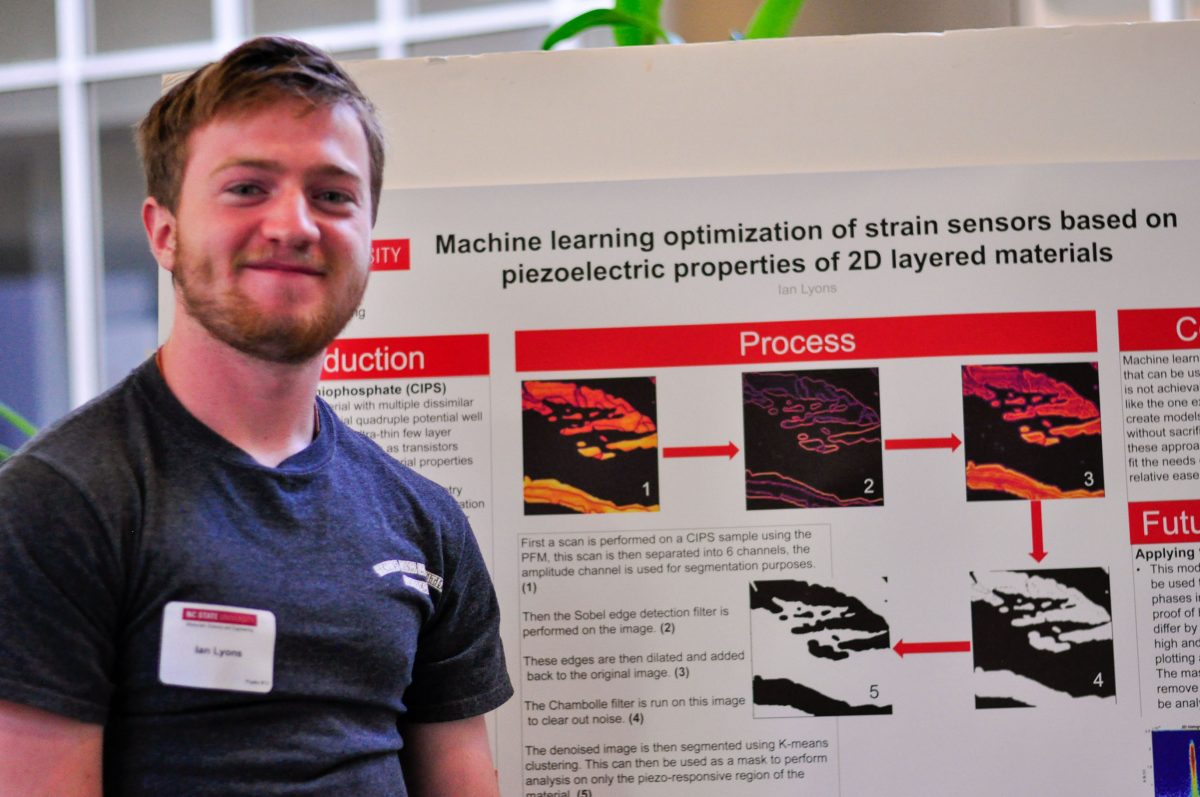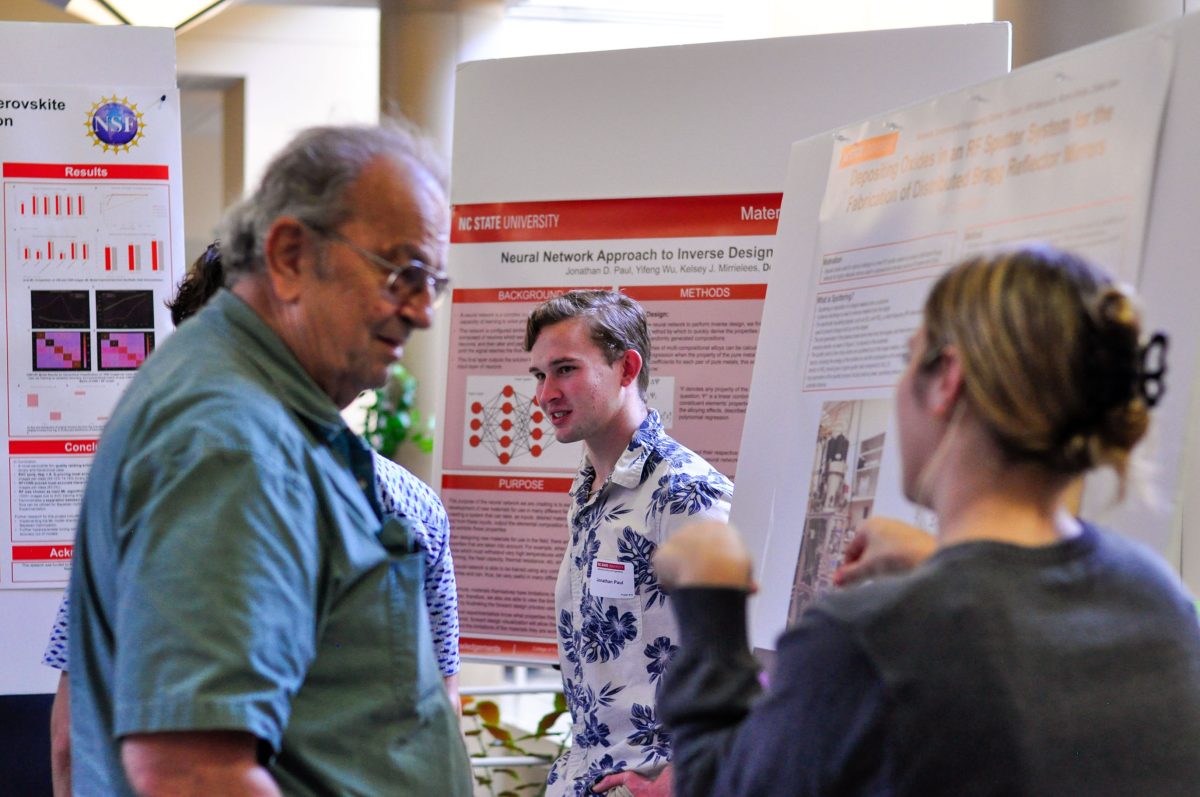The department’s ten-week MAT-DAT REU was completed on Friday, August 5. Following an impressive turnout at the poster presentation on Wednesday, August 3, the departing class held a competition for the best poster presentation, which was won by MAT-DAT REU participant Gabe Graves, and best poster, won by NC State REU participant Ayden Ferrell.
What is the MAT-DAT REU?
The NSF-sponsored REU Site in Materials Engineering with Data Science (MAT-DAT) provided undergraduate students with training and hands-on experience in data science through their involvement in cutting-edge materials engineering projects within the NC State University community during this 10-week program. Projects integrated machine learning, materials informatics (MI), statistical and mathematical methods, and other data-science tools in experimental and computational-based materials discovery.
MAT-DAT REU participants share their experiences
- Ishan Ghosh majors in Materials Science and Engineering at Clemson University. Learning about the MAT-DAT REU through a friend also looking at REU programs, Ishan calls the experience “enlightening.” The program expanded his horizons, giving him an overall unique experience. Ishan’s “aha moment” was getting his Python code to compile without any errors. Sharing kudos to MSE student coordinator Hillary Stone, his favorite part of the program was making connections with others from different backgrounds who share similar interests. To break up his time researching, Ishan recommends a visit to the State Farmer’s Market near NC State’s campus. His parting quote: “Go in with an open mind ready for whatever may come your way.”
- Drew Hollett majors in Civil Engineering at Tufts University. Drew was recommended to the MAT-DAT REU by a professor at school. He says the experience was very rewarding and gave him the opportunity to do theoretical and experimental work. He picked up skills applicable to other fields and got to picture life as a graduate student. Giving praise to MSE Professor Yingling, student coordinator Hillary Stone, and Professor Gupta’s research group, his favorite part of the program was choosing how to solve a research problem due to the open-ended curriculum. Drew loved the openness of the NC State campus and surrounding areas like Lake Raleigh. Drew strongly recommends the REU: “It’s a great program for students interested in learning about how computer science and machine learning can be applied to engineering.” His parting quote: “Sometimes you just need to take a break to get the answer to a hard question.”
- Ian Lyons majors in Chemistry at the University of Washington. Ian learned about the MAT-DAT REU through the NSF website. He was excited to work directly with his PI, Professor Balke, and he enjoyed learning how to code and apply machine learning to real-world problems. His favorite part of the program was working with actual real-world data. “The satisfaction of seeing your hard work pay off felt very nice,” says Ian. He recommends the REU to anyone interested in doing research in the future. He thinks it is a good way to quickly find out if research is for you and what your strengths and weakness are. It also helps to build many skills that are necessary to succeed in the academic world with much less pressure. For recreation, Ian was drawn to the NC State rock climbing wall in the Carmichael Gym, as well as the rock climbing community. His parting thoughts: “Take this opportunity to try new things and spend time with your roommates! We went skydiving and I am glad to have had the group experiences we had. There are not a lot of people on Centennial Campus during the summer, so get to know the people that are here. Introduce yourself and exchange socials at all of the welcome REU events because there are not many chances afterward to do so because people are most open to making friends when they first arrive somewhere new.”
- Zhane McCleod majors in Aerospace Engineering at the University of Florida. Zhane learned about the MAT-DAT REU through her job. She feels grateful for the exposure to Python, machine learning, as well as graduate school. Zhane loved how free this program was: “Housing and travel are paid for. You are paid generously, even if you don’t have a summer internship or summer classes, an experience like this allows one to travel. I was able to work on my project in my own space and on my own time.” Zhane’s “aha” moment was discovering the machine learning methods linear regression, decision trees, and random forests will not train datasets with missing values unless rows with missing values are deleted. She had nothing but amazing notes for her mentor, Josh Harris, and her PI, Jacob Jones, and his research group. “I’ve grown more as a bold and confident woman with the help of our regular group meetings,” says Zhane. “I was surprised to learn that NC State has three campuses and that Centennial Campus is as big as it is. I was also surprised how NC State has a campus devoted to engineering and textiles.” Zhane shares her parting thought: “The REU program is a mixture of fun, learning, and summer.”
- Carter Wunch majors in Chemical Engineering at the University of Rhode Island. Carter learned about the MAT-DAT REU through the NSF website and his university’s career center. He appreciated the insight and experience in the field of material science and data science: “As someone on the fence about going into materials engineering, this REU provided a great experience of both the data analysis, computational side and the experimental lab side of materials science.” Carter’s favorite part of the program was going into an actual lab to synthesize and characterize materials determined to be successful through his group’s earlier data analysis. He recommends the program to students focused more on the computational side of materials science as opposed to students looking for a mostly hands-on lab experience. Overall, Carter felt the REU was well-structured, and credits his PI, Professor Augustyn, and his mentor Saeed Saeed for all of their help throughout the REU. Carter shares his parting thoughts for future applicants to the REU: “Learn some coding language or Python before starting the REU. It will help a lot in the short time you have to do actual research.”
MAT-DAT REU Poster Presentations
This research was supported by the National Science Foundation DMR-2150360 REU Site: Materials Research with Data Science (MAT-DAT)
| ISHAN GHOSH
PI: Wenpei Gao |
Data Analysis of Microplastics Relating to Coastal Science |
| MARIEL GOMEZ
PI: Melissa Pasquinelli |
Computational design of green bioplastics from cellulose derivatives |
| GABE GRAVES
PI: Aram Amassian |
Machine Learning-Driven Image Classification of Perovskite Film Quality for Closed-Loop Experimentation |
| ANDREW HOLLETT
PI: Rajeev Gupta |
Improving the Corrosion Properties of Multi-Principal Element Alloys using Data Science |
| SKYLER KAUFFMAN PI: Don Brenner |
Investigation of Order-Disorder Phenomena for a High Entropy Carbide |
| IAN LYONS
PI: Nina Balke |
Machine learning optimization of strain sensors based on piezoelectric properties of 2D layered materials |
| ZHANE McCLEOD
PI: Jacob Jones |
PhosFORUS: Predicting Reusable Candidate Phosphorous Removing Materials using Machine Learning |
| JONATHAN PAUL
PI: Doug Irving |
Neural Network Approach to Inverse Design of High Entropy Alloys |
| BRYAN WRIGHT
PI: Ramon Collazo |
Extracting components of LED efficiency through cryogenic electroluminescence measurements |
| CARTER WUNCH
PI: Veronica Augustyn |
Data-Driven Synthesis of Metastable Hydrated Transition Metal Oxides |
NC State REU Poster Presentations
This research is supported by the College of Engineering Enhancement Fee.
| LEAH BELLCASE
PI: Jacob Jones |
In situ Study of the (Ba, Sr)TiO3 Solid State Reaction |
| TORI CRUNKLETON
PI: Ramón Collazo |
Depositing Oxides in an RF Sputter System for the Fabrication of Distributed Bragg Reflector Mirrors |
| ALEX DRAGHICI
PI: Thom LaBean |
Novel Device for Electronics Printing using Contact Dispensing Methods |
| ELI EDDS
PI: Aram Amassian |
Modernization of RoboMapper Control Software |
| AYDEN FERRELL
PI: LUKE GATIBONI |
Availability of Soil Legacy Phosphorus for Corn and White Lupin |
| LUCAS HORTON
PI: Rajeev Gupta |
Electrodeposition of Copper and Zinc Oxide on Stainless Steel Substrates |
| SOPHIA ISACCO
PI: Doug Irving |
Investigating Properties of Pseudomorphically Strained Zinc Selenide with Density Functional Theory |
| IAN MERCER
PI: Kaveh Ahadi |
Liquid Phase Epitaxy for Narrowband Semiconductors |
| JOE SCHROEDL
PI: Aram Amassian |
RoboMixer: Automated Perovskite Substrate Manufacturing and Testing using a Robotic Platform |
| SHARON YANG
PI: Rajeev Gupta |
Effect of post-processing on corrosion performance and hardness of feedstock modified and additively manufactured 316L stainless steel |

